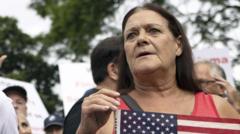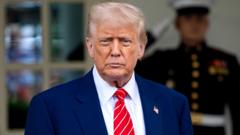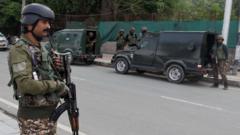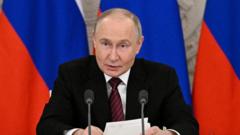At the Munich Security Conference, EU officials expressed fears that the U.S. is granting Russia too much leeway under the Trump administration.
Trump Administration's Approach to Ukraine Draws European Concerns Over 'Appeasement'

Trump Administration's Approach to Ukraine Draws European Concerns Over 'Appeasement'
Diplomatic tensions rise as Trump's strategy for ending the Ukraine conflict raises red flags among European leaders.
In a pointed critique, Kaja Kallas, the EU's top foreign policy diplomat, voiced her worries over President Trump's lenient stance toward Vladimir Putin concerning the ongoing war in Ukraine. Speaking at the Munich Security Conference, Kallas, who previously served as Estonia's Prime Minister, characterized the U.S. approach as "appeasement," a term laden with historical implications denoting submission to aggression.
Kallas's concerns are not isolated; many diplomats at the conference echoed similar sentiments, questioning Trump's commitment to establishing a robust peace process that involves both Ukrainian and European interests. The pivotal inquiry remains: what kind of peace agreement does the Trump administration envision, and will it bypass the necessary involvement of Ukraine and its allies?
Discussions preceding the conference revealed confusion among European officials, who noted significant discrepancies in messaging from the U.S. delegation. The remarks made by U.S. Secretary of Defense Pete Hegseth contradicted those of Vice President JD Vance, diminishing clarity at a crucial diplomatic juncture.
European leaders are also worried about the implications of a cease-fire allowing Putin the opportunity to regroup and strengthen his military forces, potentially endangering Ukraine's sovereignty once more in the future. Various conversations intended to clarify Trump's national security strategy did not yield any actionable plans to ensure that Russia would not exploit a temporary peace to rearm and resume aggression.
Kallas's concerns are not isolated; many diplomats at the conference echoed similar sentiments, questioning Trump's commitment to establishing a robust peace process that involves both Ukrainian and European interests. The pivotal inquiry remains: what kind of peace agreement does the Trump administration envision, and will it bypass the necessary involvement of Ukraine and its allies?
Discussions preceding the conference revealed confusion among European officials, who noted significant discrepancies in messaging from the U.S. delegation. The remarks made by U.S. Secretary of Defense Pete Hegseth contradicted those of Vice President JD Vance, diminishing clarity at a crucial diplomatic juncture.
European leaders are also worried about the implications of a cease-fire allowing Putin the opportunity to regroup and strengthen his military forces, potentially endangering Ukraine's sovereignty once more in the future. Various conversations intended to clarify Trump's national security strategy did not yield any actionable plans to ensure that Russia would not exploit a temporary peace to rearm and resume aggression.




















